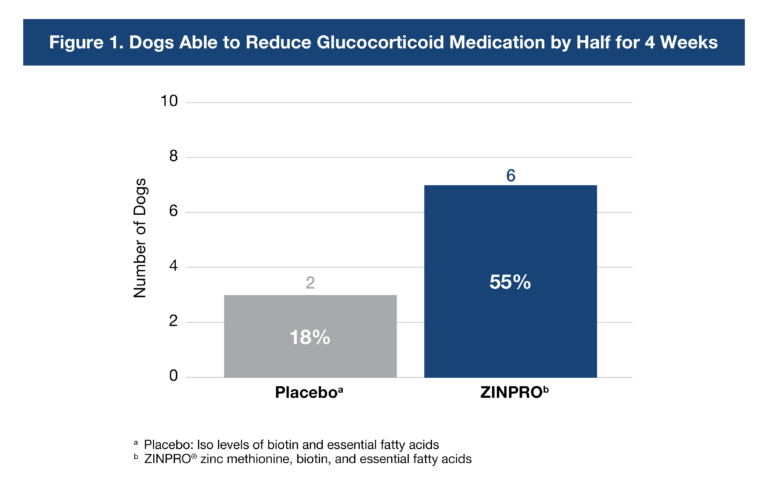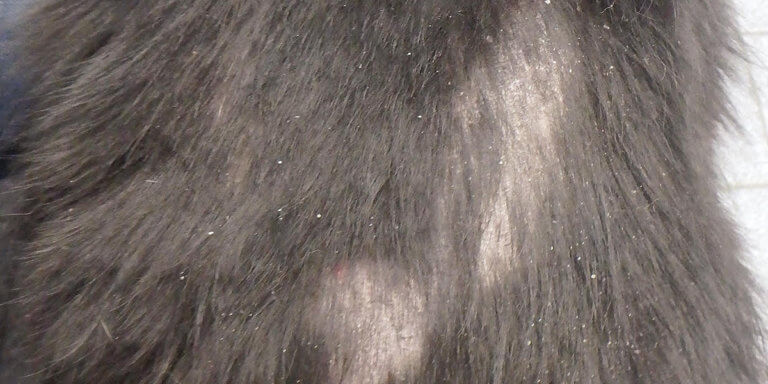Allergies come in many different forms and can impact us in unique ways. I’m sure we can all agree no matter the type of allergy, it causes discomfort. Now just think about your pet. Allergies are quite common in pets and can cause the same discomfort that affects their mood, energy and overall well-being.
Often an allergy is overlooked by the pet parent. One such condition is Canine Atopic Dermatitis (CAD). Canine Atopic Dermatitis is a hypersensitivity or allergy of the skin that causes inflammation or irritation. In fact, it’s the second most common allergenic skin disease, second only to fleas. It’s quite common in dogs, but atopy can also affect cats as feline atopic dermatitis.
Allergic reactions can be brought on by normally harmless substances like grass, mold spores, house dust mites and other environmental allergens. But it can also be caused by an internal allergy, such as food.
CAD starts with an itchiness of the skin prompting your dog to begin scratching. Just like humans, dogs have normal staph and strep bacteria on the skin surface, but with excessive scratching the skin may break. When this happens, staph or strep bacteria may enter the broken skin and cause a bacterial infection. CAD can make life uncomfortable for your pet and, in its worst case, can affect their attitude and overall well-being.
Unfortunately, symptoms of CAD vary, making it hard to diagnose. Some dogs have intermittent itchiness, so it’s not really a problem, but it may progress to severe skin irritation causing constant discomfort with chronic or almost constant itching, biting or scratching of the skin. If not controlled and treated, this may lead to significant skin damage, hair loss, loss of sleep, possible infection or other complications.
What Causes Dermatitis in Dogs?
Our family companions are sensitive to allergens just like we are as humans. Pets suffer from seasonal allergies and fleas — as well as have reactions to shampoos or detergent used to clean our pet’s bedding. An outside dog may have allergies to sawdust, straw or hay used for bedding or even normal grasses and plants in the yard. Now take that one step further, they may also have sensitivity to specific food-borne allergens or a medication.
Canine Atopic Dermatitis Treatment Options
There are two effective medications for CAD — glucocorticoids and cyclosporine. While both products have shown efficacy in controlling the itchiness associated with CAD, they can negatively affect hair growth and in some cases, cause a dog to lose its hair.
Research has proven that zinc — an essential trace mineral — is a constituent or activator of at least 300 known enzymes, including those important for skin and wound healing, as well as cell replication. Rapidly dividing cells, such as those of the epidermis or skin, are dependent on zinc to provide a strong skin or epithelial barrier against bacteria. This is important, as between six and 20% of the zinc stored in the body — human and animal — is in the outermost epithelial layers of the skin. Interestingly, the lining that protects the gastrointestinal and respiratory tracts is also protected by an epithelial layer.
To demonstrate the potential superpowers of Zinpro zinc, Zinpro Corporation partnered with McKeever Dermatology Clinics based in Minneapolis, Minnesota, to prove that supplementation of this special form of zinc in a dog’s diet can help reduce the severity of CAD.
The research project started with 36 dogs diagnosed with CAD and on a controlled glucocorticoid or cyclosporine medication program and were under a veterinarian’s care for more than one year.
Each dog in the study was evaluated using the Canine Atopic Dermatitis Lesion Index (CADLI) scoring system. The veterinarians and pet parents were asked to score how itchy their pet was using a scale ranging from a normal dog with no itchiness (0) to a dog with almost constant itching (10).
Each dog received a supplement that contained a combination of ZINPRO® zinc methionine, biotin and essential fatty acids, or a placebo with biotin and essential fatty acids but no zinc in a random order. The biotin and essential fatty acids are key to maintaining skin structural integrity and functionality and are important to some immune cell functionality too.
This was a double-blind research study, so the veterinarians didn’t know what the client was getting, and the pharmacist didn’t know what they were dispensing. Each dog received one of the two treatments for 12 weeks, and then switched to the opposite treatment for another 12 weeks. Note: each dog received both treatments, ZINPRO and Placebo in a random order. Each dog was evaluated using the CADLI scoring system every four weeks of the study.
After dogs had received the ZINPRO zinc methionine treatment for eight weeks the following results were found:
- 44% reduction in CADLI score with no change in dogs receiving the Placebo treatment.
- 69% of dogs on cyclosporine and 55% on glucocorticoids were able to decrease their medicinal dosage by half without incurring an allergy flare.
- Visual observations revealed an improvement in skin and coat quality.



Zinc Helps Control Canine Atopic Dermatitis
People have asked, “Why can’t I just apply a zinc methionine cream to the skin of my dog?” Well the interesting thing about ZINPRO zinc methionine is that it works from the inside out, strengthening the skin and immune system to respond to allergens in the external environment or internal food-borne or medicinal allergens.
Zinc is critical to that protective epithelial barrier and/or lining and a key component and building block in both the skin and immune system. That’s one of the real keys to this study: It helps demonstrate that not only are we helping enhance the immunity of these animals, but we’re helping to improve the efficiency of their immune systems to make them more resilient against environmental or internal allergens.
Zinpro has conducted dozens of studies that prove zinc from Zinpro Performance Minerals® (ZINPRO zinc methionine and Availa®Zn) can improve the integrity of the lining of the gut by 15% to 40% and improve the outer skin of the body by over 40%.
To learn more about canine atopic dermatitis and how zinc from Zinpro Performance Minerals can help you manage this allergy of the skin, visit our website. To learn about feeding performance trace minerals in your dog’s nutrition plan, contact a Zinpro representative today.

